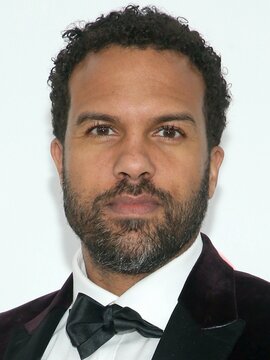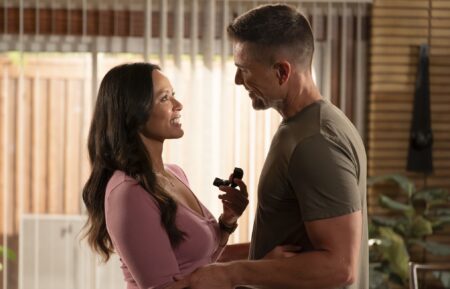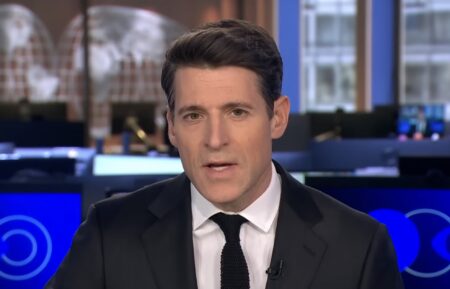‘The Handmaid’s Tale’: Ann Dowd Explains ‘Traitor’ Aunt Lydia & Teases Final Episodes
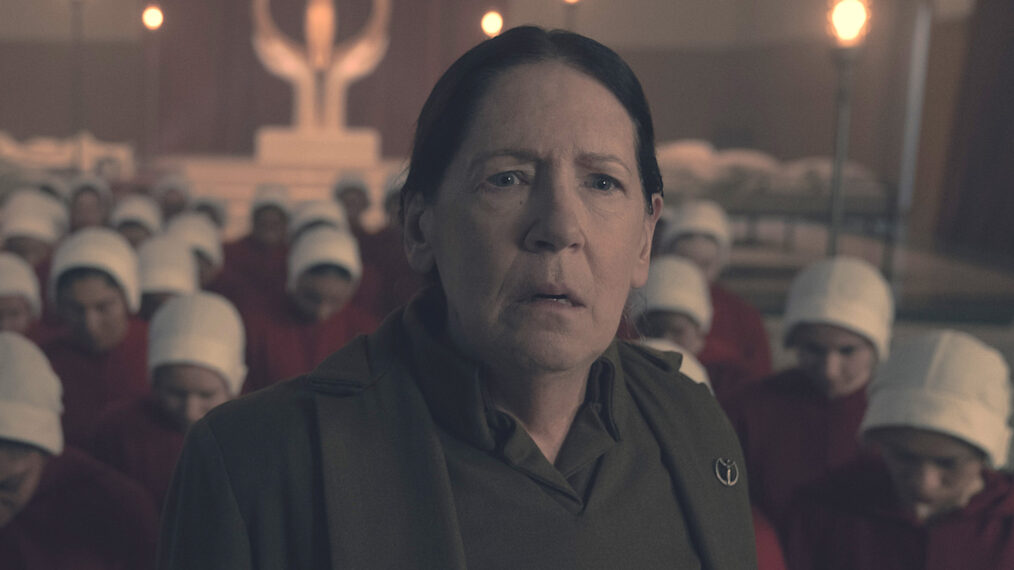
Spoiler Alert
[Warning: The following contains MAJOR spoilers for The Handmaid’s Tale Season 6 Episode 8, “Exodus.” It also contains a discussion of sexual assault and domestic violence.]
Aunt Lydia has passed the point of no return. Ann Dowd‘s character in The Handmaid’s Tale reached her tipping point in Episode 8 of the final season, available on Hulu as of May 13. With only two episodes left in the series, this scene serves as both the climactic moment of the Lydia plot that’s been brewing since early Season 5 and serves as the foundation for The Testaments spinoff that Dowd will lead.
June (Elisabeth Moss) and Moira (Samira Wiley) returned to Gilead in the episode to carry out a plot to kill Boston’s commanders at the end of Episode 7. Their setting: the wedding of Serena Joy Waterford (Yvonne Strahovski) and High Commander Gabriel Wharton (Josh Charles). Disguised as Handmaids and equipped with retractable knives hidden in secret pockets sewn into the blood-red uniforms, June and Moira led the Boston Handmaids through the plot that involved a sleeping agent in the wedding cake baked by Rita (Amanda Brugel). As the leaders of Gilead were asleep in their homes post-ceremony, the Handmaids would arrive, kill the commanders, and flee.
D’Arcy Carden‘s rebellious Aunt Phoebe helped carry out the plan, but Aunt Lydia returned from her travels early and caught onto the scheme. She caught the girls in the Red Center and was ready to “shoot a traitor” when she saw Moira and realized Phoebe was in on it all. But then June and Janine (Madeline Brewer) arrived. June was steady as she calmly explained the error of Lydia’s ways to convince her to let them all go. She sagely pleaded to Lydia that in her “heart of hearts,” she knows that “rape is rape,” and that there’s no other way to spin Gilead’s Handmaid system that ritualistically sexually assaults women and steals their children.
June’s speech was “the highway on which we are traveling,” and then Janine’s arrival was “the destination” that made “the final step possible,” Ann Dowd tells TV Insider. That final step was Aunt Lydia setting the Handmaids free. Here, the Emmy-winner explains how Aunt Lydia was brought to his moment, the immediate repercussions, and how this sets up The Testaments, which Dowd tells us is set “4 to 5 years after” the end of The Handmaid’s Tale.
In the scene in the Red Center, Aunt Lydia doesn’t immediately remember Moira. What does it say about her that she doesn’t recognize her? I would think that Aunt Lydia would never forget one of her “girls.”
Ann Dowd: Oh, she remembers. She’s just in a state of shock. If you sat her down, let her catch her breath, and this all wasn’t falling apart as it is, she would know who Moira is. I think she’s darn scared of her, and she’s in shock and doesn’t know what in the heck is going on here. It’s been a while with Moira, but you never forget — or she never will forget, ever.
I would say on a gut level, she connects and knows, I know this girl. Help. She’s trouble. She’s trouble. But again, it all is moving so quickly and she’s in such a state of real shock that she just [is thinking], “Who are you?” It might as well have been, “What are you doing here? Why are you here? What is going on?”
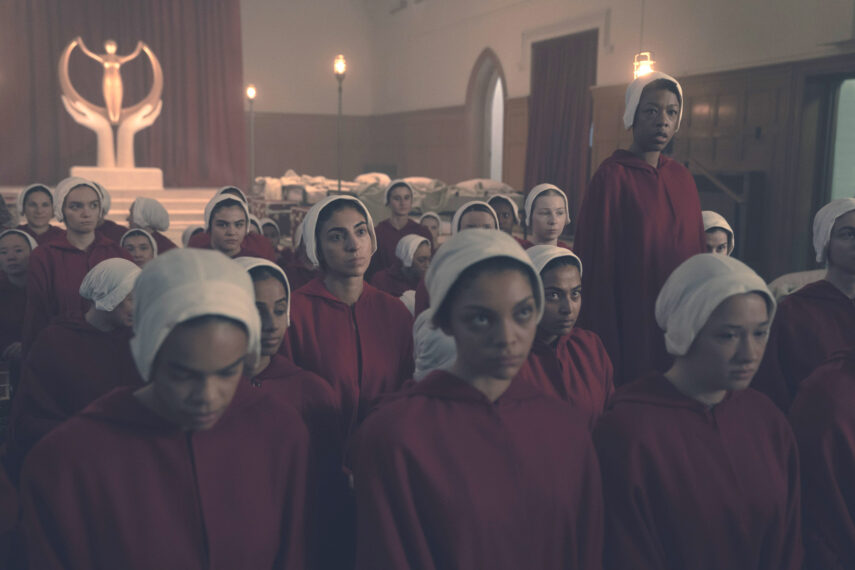
Disney / Steve Wilkie
She’s trying to get her bearings and process the gravity of the situation around her. Is she thinking, if Moira’s here, June can’t be far?
[Lydia believes] June Osborne has to be at the source of this. I think Lydia’s absolutely certain. Don’t tell me for one minute June Osborne didn’t set this up. Ruining my girls. How dare she? And then her accomplice is Moira.
Does Aunt Lydia hate June, or does she love her and wish she was different?
I think she has profound love, and she admires her tremendously. June Osborne is about the strongest person Lydia has ever met, and the most committed, who stands up for what she believes in and never ever gives up no matter what. I think Lydia is astounded by her on a very strong gut level.
Is Lydia scared of June?
I think possibly, but very willing to jump in. She doesn’t know what June is doing, so that’s always unnerving. How am I going to handle this? Well, I’m going to do the very best I can. June, she’s up there with the smarts and it’s terrifying. It’s really terrifying. She’s going to do what she said she was going to do. This is years in the making.
And for Lydia, is the sense of fear that she gets at the idea of June returning or plotting something, is that a macro fear about what June could do for this system that they all live in? Or is she afraid of how June could affect her personally?
Well, when you say her for Lydia, her means all the girls. That’s the identity that Lydia lives. What she needs separate from the girls, I don’t even think she has a clue, she’s so tied to the girls. They’re everything to her. And so June is a risk, a major risk to “my” girls and what we’ve accomplished in all of these years. And here’s this fierce, terrifying [woman]. How dare she come into this situation and do what she’s doing? It’s a tough one for Lydia, that’s for sure.
And so at the end of this scene, all of her girls are gone and she’s let them go, as you said, she’s let go of herself.
Yes.
So when she falls to her knees and asks God for help, is what is she asking for help for?
She’s asking for forgiveness. Please help me to live with myself after this and to know how to move forward. Please, God, I am lost. I am lost. And I don’t know what to do. Please, please forgive me. Show me the right way.
June could have come in screaming, but anything like that, Lydia would’ve stood up to. Don’t you dare scream at me. But she doesn’t. She just explains it sentence by sentence. “This is what you’re responsible for.” There’s no escaping it. It’s too powerful.
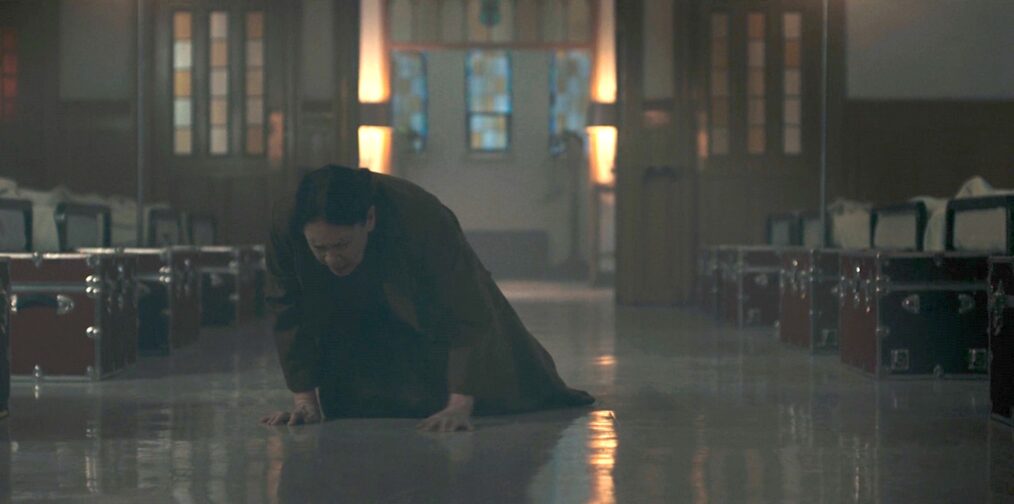
Hulu
What was the moment during June’s monologue to Lydia in this scene where Lydia knew she was going to let them go? Did June convince her or did Janine convince her?
It’s both. June is building the highway on which we are traveling, and waiting at the destination is Janine to make the final step possible. Again, it’s love for Janine and love for her girls.
I mean, have you ever had that in your life? Can you imagine something you’ve done — done for years and years — and suddenly you’re brought to awareness that you have been doing things wrong? It’s unbelievable. And the thing is, when they don’t scream, when you’re just being talked to and explained, “Look at this, look at that,” there’s no denying, there’s no running away. There’s no place to go.
Right, because anger could be written off as overemotional, as someone’s overreacting maybe. But something as calm as this is like this is just a fact.
Well, I don’t know if I’d call it overreacting. I would say, “You want to fight? I’ll fight with you. I’m as good as anybody in this.” And so it triggers her. Again, it’s reacting emotionally, which is not the way Lydia has wanted to go all her life in Gilead. Don’t react emotionally. Think through the situation. If someone screams, that’s it. Forget it. You want to yell, June? I’ll yell right back at you forever, however long you need. But speaking the way she did, it grows over time over what she says, a little more seeps in, a little more, a little more until that’s it.
The moment when Lydia approaches Janine and says, “I’m sorry he hurt you, dear,” your delivery of that line was so profound. I could feel Lydia’s entire evolution in that line. What was Lydia thinking and feeling when she said that to Janine?
I don’t know that she was thinking anything. She was brought straight to her knees, and this is the final standing up to, as you say, the line. It’s a truth that comes out of Lydia, a profound, profound regret for not seeing things sooner and that you were hurt by these men. I’m so deeply sorry. That’s all she can say. What can she say? That’s it. I don’t think there was a lot of thought there. That was just landing on her feet. Nothing to hide behind. There is my daughter in front of me, my dear, dear, dear Janine, and how dare anyone hurt her?
So Lydia sees Janine as her daughter?
Oh, I think that’s the relationship. It grows over time, but boy, that’s where we end. That’s how close [they are].
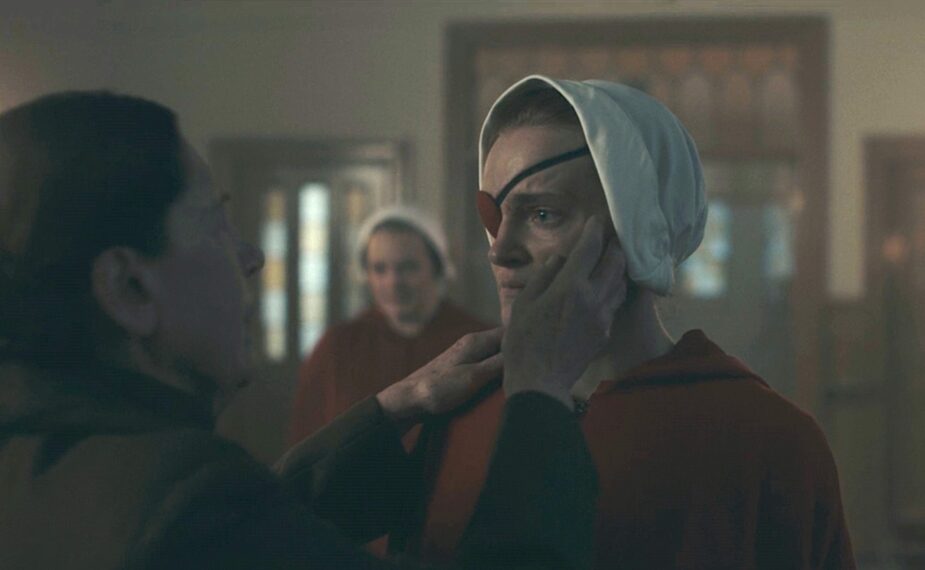
Hulu
I spoke with Madeline Brewer about Season 6 Episode 7, and she agreed that there’s a profound love intertwined with their painful history. She said Janine doesn’t have much of a role in the revolution in terms of planning attacks like June and Moira do with Mayday. But Aunt Lydia is one of the most powerful, influential aunts in this world. So for her to be changed by Janine, the importance of that can’t really be downplayed.
No. And she [Lydia] will never be the same again. And you see this in The Testaments. She’s changed profoundly.
Lydia has formed her entire identity around these girls. They are her, in her mind. So for her to let that go, that she, for Lydia, the risk there is losing all sense of self and having nothing after and having to start over.
Yes. That’s a good phrase. I think she does come to that place, loss of self. Loss and begging for forgiveness.
That’s an opportunity, though. So where does she go from here?
Well, it’s interesting. She goes somewhere, because Gilead survives — some part of it. Lydia starts over, so to speak, and you see what happens in The Testaments.
When Lydia’s hugging Janine in the Red Center, does she think that’s a final goodbye?
Yeah, I think so. She doesn’t see anything but the present moment. She doesn’t see what’s ahead. She’s not looking at the past. She’s accepting where she is in this moment, and it’s goodbye.
Will we see June and Aunt Lydia cross paths again before the series is over?
Yes, you will… Those questions will be answered, don’t worry.
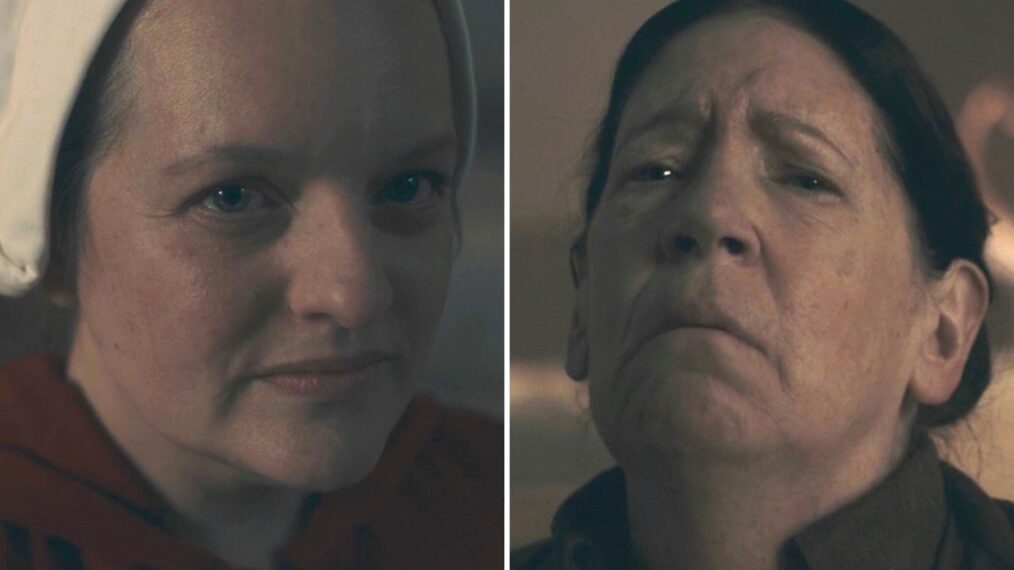
Hulu
What else can you tease about what’s to come in these final two episodes for Aunt Lydia? What kind of journey does she go on now that she has lost herself and has to change?
It is not a smooth sailing. The girls don’t get too far, some of them. Lydia has to regroup. She’s also considered a traitor because can you imagine? Letting the girls go? Are you kidding me? So she’s not a free woman, and she accepts that she deserves that. That’s where she is.
So she’s not going to lie after this?
No.
She’s going to own letting them go?
Yeah. It’s powerful. I don’t want to tell you any more than that.
In Season 1, Aunt Lydia saw the violent punishments for the girls as saving them. A “this is how you’ll learn your lesson” mindset. How has her definition of saving these women evolved across the series?
Well, it becomes less and less physical. You’ll notice the cow prod disappears. And what good ever does it do to scream and to physically punish? After a while, you think just naturally, “There’s a better way. There’s a better way.” She’s being taught by these girls and affected by them. And I think, as you said, she definitely believes that harsh treatment is necessary to get them on track. But she’s able to do so slowly over time without that level of punishment. It just evolves that her way of doing things does not require that any longer. I mean, maybe once in a blue moon, but not often at all.
We’ve seen some of Lydia’s backstory pre-Gilead in previous seasons, but is there any sense within her that she feels betrayed by Gilead? Because Lydia before Gilead, I don’t think was as accepting of physical violence as she is when we see her as Aunt Lydia in the Gilead years. Is there a sense in her mind that Gilead made her into this?
It depends on how you think it all began. I think it was very helpful that our showrunner, Bruce Miller, said she was a teacher. And you do see that in the backstory for Lydia. And she was a very religious person, had a very, very strong belief in God and in the way the world should operate. And I don’t know if that goes with what Margaret Atwood would say, but given our story and the way we’re telling it, I believe that’s true. I can imagine pre-Gilead people saying, “We have got to do something here. I mean, this is out of control. Sleeping with anyone, no relationship with God whatsoever. Having a child without marriage, and the fact that having children has become such an almost impossible thing. The birth rate dropping, something has to be done.” And when you inherit a bunch of girls who are angry and rude and fresh, and you’ve got to make strong choices to get them to calm down, and you’re here to learn something and it’s going to take time and you’re not going to love it. I think it takes a fierce hand, especially in the beginning.
So it seems it was like a personal, natural evolution for Lydia, maybe, and not so much indoctrination from Gilead. So now in these final episodes, as we see in the end of the Red Center scene, she feels the weight of how wrong she was now. Is that where we leave her?
The way things began [in Gilead for Lydia], she’s going to be one of the head aunts. It’s so interesting, the story is a little different with Testaments and how it came to be. But Lydia’s no fool. If she’s going to be an aunt, she wants to be the one in charge. She doesn’t want to be somewhere in the line. But in communication with the commanders who are going to be in charge [as Gilead was forming], Lydia accepts that as we begin, they’re going to be in charge.
What is the status of Lydia’s relationship with God after Season 6 Episode 8? And how is that evolving in The Testaments?
Her belief in God and the feeling [of] can she please be forgiven that she has done wrong, it brings her to her knees, begging for God’s forgiveness. She doesn’t let go of God. She holds on even tighter and begs for forgiveness. Her belief in God stays present right through The Testaments. She’s not put to the test like she is in Handmaid’s in The Testaments — at least not yet — but belief in God is central to their world, no question, and in her world, for sure. And [it] stays that way.
The Handmaid’s Tale, Tuesdays, Hulu












